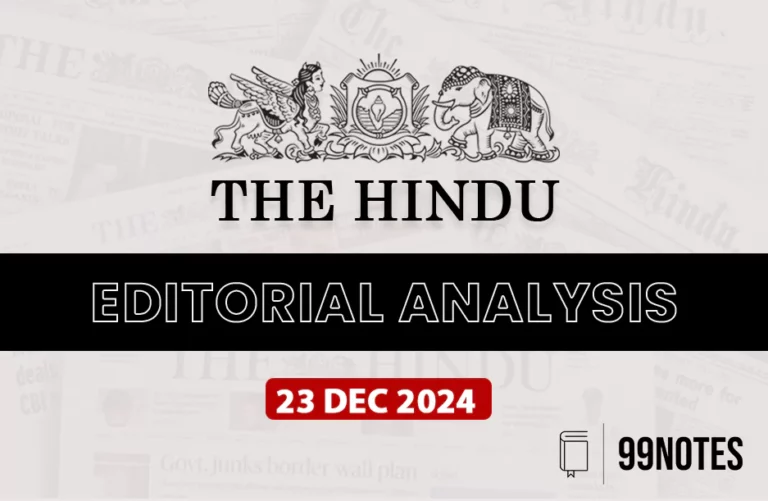24 January 2025 : Indian Express Editorial Analysis
1. Our Own Deep State
(Source – Indian Express, Section – The Editorial Page – Page No. – 10)
| Topic: GS3 – Indian Economy |
| Context |
|
Analysis of the news:
The Need for Reform in Policymaking
- The annual budget process in India continues to resemble an outdated colonial tradition, conducted behind closed doors.
- This method, designed nearly 200 years ago, remains unaltered, catering primarily to bureaucratic and media interests rather than democratic accountability.
- The persistence of this antiquated practice raises questions about its relevance in a modern democracy.
Economic Slowdown Amid Global Growth
- Despite global economic expansion, including optimistic IMF projections, India’s GDP growth has inexplicably slowed.
- This anomaly calls for accountability from monetary and fiscal policymakers. Historically, high real interest rates have been linked to policy missteps, as seen in the pre-COVID slowdown of 2018-19.
- Beyond monetary policy, however, the author attributes much of the current economic stagnation to high personal income tax rates, excessive overall taxation, protectionist tariffs on manufactured goods, and restrictive foreign direct investment (FDI) policies.
- These measures, driven by a “Deep State” comprising industrialists, bureaucrats, and media influencers, undermine growth and competitiveness.
The Role of the “Deep State” in Policy Formation
- Policy in India is disproportionately influenced by a nexus of industrialists, senior bureaucrats, and media influencers, sidelining independent experts.
- This dynamic is a significant departure from global norms, where mature democracies encourage lateral entry and independent policy advice.
- While former Prime Minister Manmohan Singh successfully incorporated external expertise as Finance Minister, he was unable to replicate this approach during his tenure as Prime Minister.
- Similarly, the Modi administration’s promises of reform have failed to materialize, suggesting the entrenched power of the “Deep State.”
Fiscal Deficit Obsession and its Consequences
- India’s fiscal policy prioritizes reducing the fiscal deficit through increased taxation rather than fostering economic growth.
- This strategy has drawn criticism for its limited impact on food inflation and its failure to stimulate growth.
- The article questions the rationale behind such a narrow focus, arguing that this obsession with taxation undermines broader economic goals.
Personal Income Tax (X-PIT): A Global Perspective
- India’s personal income tax-to-GDP ratio (X-PIT) is projected to reach 3.9% in FY2025, surpassing most non-advanced economies.
- Comparisons with countries like China (1.1%), Vietnam (1.8%), and Brazil (3%) highlight India’s disproportionately high taxation.
- Even developed nations like Korea (4.8%) achieve similar or slightly higher X-PIT ratios despite significantly higher per capita incomes.
- This suggests that India’s tax burden is misaligned with its economic development stage and income levels.
Overall Taxation (X-TAX) and International Comparisons
- India’s total tax-to-GDP ratio (X-TAX) is expected to exceed 19% in FY2025, comparable to developed nations like the USA (19%) and Korea (20%).
- However, these countries enjoy much higher per capita incomes, making India’s tax burden excessive relative to its economic capacity.
- In contrast, other developing economies, such as China (15.9%) and Vietnam (14.7%), maintain lower tax ratios, promoting growth and investment.
The Costs of Excessive Taxation
- High taxation in India leads to increased government spending, often on “freebies,” as criticized by Prime Minister Modi.
- It also burdens the middle class, which bears the brunt of tax collection. This discontent has likely contributed to the surprising decline in the BJP’s popularity in the recent national elections.
- Furthermore, excessive taxes, coupled with restrictive FDI policies and high real interest rates, stifle economic growth, discouraging investment and innovation.
International Influences and Policy Shortcomings
- The role of international organizations, such as the IMF and World Bank, in shaping India’s tax policies warrants scrutiny.
- Recommendations from these institutions, including those influencing GST policies, have often been lopsided or misaligned with India’s economic realities.
- Despite decades of discussion around direct tax reform, successive governments have failed to deliver meaningful changes.
Conclusion:
- India’s fiscal policy is at a crossroads. Excessive taxation, protectionism, and limited inclusion of independent expertise in policymaking have hampered growth and economic potential.
- Immediate corrective action is required to realign policies with the nation’s developmental goals.
- Addressing these issues by the next budget cycle, or at the latest by February 1, is crucial for ensuring sustainable growth and equitable development.
| Practice Question: Examine the role of fiscal policy, including taxation and foreign direct investment (FDI) regulations, in influencing India’s economic growth. Discuss the challenges and suggest measures to align India’s fiscal strategy with its developmental aspirations. (250 Words /15 marks) |
For more such UPSC related Current Affairs, Check Out: –23 January 2025 : Indian Express Editorial Analysis



